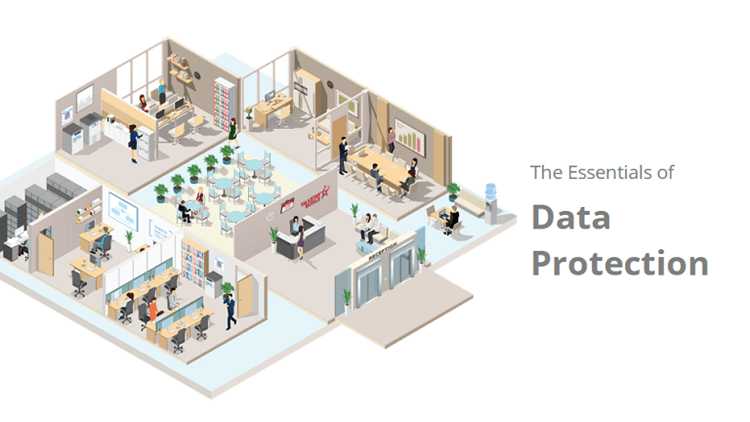The Essentials of Data Protection (GDPR)
The Essentials of Data Protection (GDPR) training is ideal for anyone who handles personal information in their job. During this data protection training course you will learn what the different types of data are and about the six principles, how to handle sensitive data, the rights of data subjects, and key responsibilities of the information commissioner.









Course Overview
Format
- Intermediate
- 1-2 Study hours
- Online Study
- Self-Printed Certificate
Accreditation
- 1-2 CPD Hours
- CPD Certified
Course description
This course is aimed at those involved in the handling of people’s information as part of their day to day role.
This Course will provide a Data Protection (GDPR) overview for those looking to gain more information on how to uphold the 6 principles. With this course learners will understand the key principles and process under the regulation and what their roles and responsibilities include.
In its early days, data protection compliance quickly became a key priority for businesses, as the risk of large financial penalties for failing to introduce a culture of greater data transparency were introduced.
Legislation has since given consumers more power than ever before over their data. They now have the right to know how their data is used and stored, and for how long. They also have the right to be deleted from marketing databases, and businesses that fail to comply with any of these requests could find themselves facing a fine of up to £17 million, or four per cent of annual turnover, depending on which is greater.
It is vital that everyone who handles data as part of their job is aware of the current legislation, and this is exactly what the Virtual College’s the Essentials of Data Protection e-learning course is designed to help with.
Why take this GDPR training course?
It's important that everyone within a business is aware of the new data protection rules and understands data protection compliance to ensure the company is staying in line with the rules laid out by the Information Commissioner's Office (ICO).
After completing our The Essentials of Data Protection course, learners will:
- Understand what data is, and the different types of data
- Recognise the six principles of data protection
- Understand how to safely handle sensitive data
- Understand the rights of data subjects
- Know the responsibilities of the information commissioner
What's covered in this Data Protection online course?
Our online data protection training course has been made for anyone working with personal data to ensure their and their employer's compliance.
| Module | What it includes |
| What Personal Data is and the Different Types of Personal Data | This section in the course gives a visual representation of different typical personal data that could be found in a workplace and explains sensitive personal data and anonymous data. It also goes on to explain what a data controller is and what they do and how data is processed in workplaces. |
| The Seven Principles of Data Protection (GDPR) | The seven principles of data protection are explained one by one with best practice examples of how they would apply to workplaces. |
| How to Safely Handle Special Category Data | Special category data needs to handled differently to other data types, here the course explains with visual examples how it needs to be stored. This section also includes information on how to be vigilent with data, data security and IT systems. |
| The Rights of Data Subjects | This section of the course explains the rights of data subjects, subject access rights, accountability and governance and how to investigate data breaches. |
| The Role of the Information Commissioner | The final module in the course explains the role of the information commissioner, data processors, penalties, personal responsibilities and how to work with data outside of the UK. |
Who is this course for?
The Essentials of Data Protection (GDPR) is designed for anyone who handles personal information as part of their job. This could be recruitment consultants, administrative assistants, marketing executives or managers of any kind. Data handling and processing forms part of many roles, so our e-learning course would be of benefit to many professionals.
This GDPR training course is also suitable for those who want to understand how companies are required to store personal data and the legal procedures for collecting personal data. This Data Protection training will also explain consumer data rights, including the six principles of data protection.
It is important to note that the content of this Data Protection (GDPR) training is based around fictional characters, places, events, businesses and incidents. Any resemblance to actual persons, living or dead, or actual events, is purely coincidental.
Testing and certification
At the end of our The Essentials of Data Protection (GDPR) e-learning course, there is a test consisting of 15 multiple choice questions, for which a pass mark of at least 75 per cent is required. Learners can have as many as six attempts at the test at no extra cost, and further tries can be arranged by contacting the Virtual College team.
After achieving a pass mark of 75 per cent, learners will be able to download and print a Virtual College certificate for their records.
Course duration
The Essentials of Data Protection (GDPR) course should take one to two hours to complete, but this depends on how quickly each individual absorbs the study material. Progress is recorded throughout by the Virtual College Learning Management System, meaning learners can take as long as they need to understand the new data protection rules.
Entry requirements
There are no specific entry requirements for this data protection training course.
You will learn
- Understand what data is and the different types of data
- Recognise the six principles
- Understand how to safely handle sensitive data
- Understand the rights of data subjects
- Know the responsibilities of the information commissioner
Who is it for?
Roles including:
- Recruitment Consultants
- Administrative Assistants
- Marketing Executives
- Marketing Assistants
- Managers of any kind
- Team Leaders
- Customer Service Staff
- Call Centre Staff
- Anyone working in a role involving using, storing or collecting personal information
The Essentials of Data Protection (GDPR) FAQs
-
How long is The Essentials of Data Protection (GDPR) Certificate valid for?
While The Essentials of Data Protection (GDPR) certificate does not technically run out, it is best practice to renew it every three years. However, we at Virtual College are constantly updating our courses to keep up to date with Data Protection regulations and guidance, therefore some organisations encourage retaking each year.
-
What are the 6 principles of GDPR?
The first principle concerns lawfulness, fairness and transparency.
The second principle is that of purpose limitation.
As the third principle, we need to refer to data minimisation.
Accuracy is the fourth principle.
The fifth principle is storage limitation.
Finally, the sixth principle is integrity and confidentiality
-
What is GDPR?
The General Data Protection Regulation (GDPR) is a legal framework that sets guidelines for the collection and processing of personal information from individuals who live in the European Union (EU).
The Data Protection Act 2018 is the UK’s implementation of the General Data Protection Regulation (GDPR).
-
How long is GDPR training valid for?
While The Essentials of Data Protection (GDPR) certificate does not technically run out, it is best practice to renew it every three years. However, we at Virtual College are constantly updating our courses to keep up to date with Data Protection regulations and guidance, therefore some organisations encourage retaking each year.
-
How often should staff have GDPR training?
Staff training should be conducted right at the start at induction or onboarding stage, to ensure compliance at the outset. After that, we suggest conducting it at least annually. Learn more here.
-
Is data protection training a legal requirement?
The General Data Protection Regulation treats training as an integral component of the overall measures required for compliance with the law. It mentions training three times out of the 99 articles in the GDPR. You can learn more about it here.
-
Is GDPR training mandatory in the UK?
Even though there is no explicit requirement for employee training, businesses are expected to train their employees. If they do not know how to handle personal data properly, they may violate the GDPR, resulting in fines for the business. Learn more here.
-
Who is required to take GDPR training?
The GDPR states that any entity which collects or processes the personal data of residents of the EU must comply with the regulations set forth by the GDPR. The GDPR is very straightforward in saying that any entity which collects or processes personal data from residents of the EU must be compliant with the GDPR.
Complying with GDPR can be a daunting task, but it's important to remember that training all of your employees is not optional! By failing to provide GDPR training for your employees, you are putting your business at risk of fines and penalties due to Data Breaches. Learn more here.
How the online courses work
-
Find a course
To begin searching for your online training you can click on the course category section on our website and browse through all of our training categories.
Alternatively if you already know the title of the training you’re looking for you can use the search bar located in the centre of the homepage and go directly to the course you want.
-
Buy the course
When buying one of our courses, you will need to enter a valid email address which will be used to create your account with our Learning Management System – Enable – where you will take the training. We will also send your purchase receipt to this email address, and any additional courses purchased in future using the same email address will be added to your system account.
Once you have purchased a course, you will be able to send this course to other people using your system account with Enable by entering the new learner’s email address so that they may access the training and set up their own system account with our Learning Management System.
If you are not 100% satisfied with your course then we offer a 30-day, no hassle money-back guarantee. To request a refund, you should email our learner support team with your receipt stating why you would like to be reimbursed. You, or your learners, must not have completed the training in order to make a valid refund claim. Any claim made after the training has been completed will be invalidated.
-
Take the course
This online course consists of a series of pages in which an instructor will talk learners through the lesson material. Pages may include supporting pictures, graphs, animation or extra sounds to help with the learning where appropriate. Some lessons will include challenges/quizzes to help learners stay engaged and interested in the material. Lessons can be taken in any order and each lesson may be paused and resumed at any stage.
The course is self-paced so learners decide how fast or slow the training goes. There is no deadline for completion but some of our courses have a test at the end to check that learners have understood the material. If the course has a test at the end then learners are required to achieve a 75% pass mark to successfully complete the course. Once learners have passed the test they are awarded a certificate, which can either be downloaded digitally or sent as a physical copy if this option was chosen when purchasing the course.
-
Your Certificate
Upon completion of any of our courses, learners will be able to download a digital certificate from Virtual College and will include the accrediting bodies logo where applicable.
If you have bought the posted certificate option (available on select courses), a high quality, seal embossed, certificate will be sent out at the beginning of the following working week.























